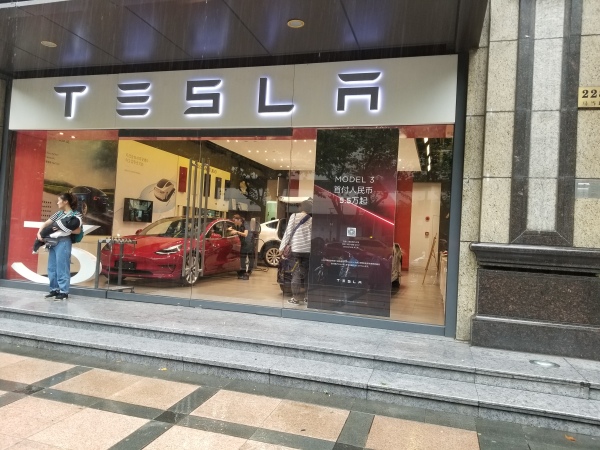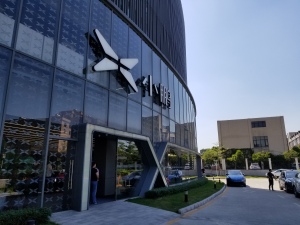How to become a lifestyle brand on the cheap, or the China EV startup dilemma
I just returned from a two-week trip to China doing research for my next report for Wards Intelligence, this one on autonomous vehicles. I will save my insights on that sector for the report itself, which will be out in coming months. Meanwhile, I have some thoughts on the electric vehicle sector, which I wrote about my first report for Wards Intelligence, China’s New Energy Vehicle Future.

BEVs charging at shopping area in Guangzhou
New energy vehicle sales – and right now we are only talking about battery-electric and plug-in hybrid electric vehicles – in China have slowed a lot. Not unexpected given the central government phased out purchase subsidies faster than initially planned. Why would it do this? Because the subsidies were encouraging cheating and not achieving the central government’s goal, which is for China to develop world-leading NEV technology.
Does this mean the electric vehicle sector in China is going to die a slow death? Not at all! Anyone who has watched China as long as I have knows that the central government is set on this plan. It’s part of Made in China 2025! But also, China’s government is pragmatic in its policy making. It tweaks plans as it goes, crossing the river by feeling for the stones and all. I expect Beijing will come out with some kind of new plan to boost NEV sales in a few months. Also, it wants the automakers themselves to figure out how to market and sell NEVs. And it likely wouldn’t mind some consolidation in the EV startup sector.
The big news in the EV startup sector while I was in China was, of course, NIO’s dismal results. Not unexpected. Does this mean NIO is dead? I think not. We still haven’t seen the outcome of the reported investment my Beijing E-town, which is of course the Beijing government. But state funds can’t be invested in loss-making enterprises, so it seems the aid will likely take the form of a loan to buy land in Beijing on which to build a plant. Why build a plant if your sales are dismal, one might ask? Chicken and egg scenario. But I think NIO will move forward with the plant. Its cars are as good or better as other EVs out there.
NIO’s troubles do, however, speak to a contradiction in these start ups development plans. As I wrote in China’s New Energy Vehicle Future, EVs must be the building block of a digital lifestyle in China. The question is, how to make a car seem like something as important to Chinese consumers as the next mobile phone. NIO tried/is trying to do that with its NIO houses, lifestyle products, etc. But those things cost a lot of money. And NIO chose some pricey though prestigious areas such as the Nanjing Lu area in Shanghai, to open its stores. Next to a Tesla store, let me add. Important to the brand image but big money sucks.

Tesla store in Xintiandi, Shanghai
Interestingly, another EV startup, Qiantu, is spending its money on a storefront in the prestigious yet pricey Xintiandi shopping area of Shanghai. Qiantu doesn’t have a vehicle on the road yet, so this is a big investment on an uncertain future. There is a Tesla store a few doors down, btw.
Meanwhile, I visited the Xpeng headquarters in Guangzhou to interview founder He Xiaopeng.

While there I met the guy in charge of developing Xpeng’s distribution locations. Former real estate guy. Xpeng isn’t going to be spending money on outlets in expensive areas such as Xintiandi, he said. Another startup, WM Motors, is aiming to be the EV for the masses. I admit that I don’t know where its stores are located. But given its goal, I don’t think it will be opening any stores in Xintiandi either.